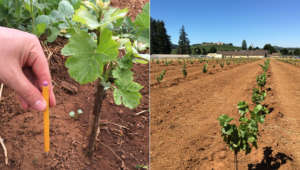Harvest 2016 is now under way at King Estate, a time when everyone at the winery is focused on the grapes coming in from the vineyard – rich in color, plump with juice, ripe and ready for crush.
But over in Block 6A, to the winery’s south just behind the greenhouses, something else is happening. Newly planted vines are taking root – soaking up the late summer sun and the gentle rains that recently fell – and are pushing their way upward. It will be at least two years before fruit from these vines is harvested.

New blocks are not uncommon; just last year King Estate planted two blocks – 01C and 01D – of Pinot Noir covering 1.7 acres on the far south side of the estate. But with limited ground left to plant, Director of Viticulture Ray Nuclo is particular about what goes in. As with Blocks 01C and 01D, the 2.3 acres that comprise Block 6A were planted earlier this spring with Pinot Noir Dijon clone 777. King Estate has about 300 acres of Pinot Gris and 158 acres of Pinot Noir, so these recent plantings increase our capacity to produce the exceptional Pinot Noir that put Oregon on the map.
The birth of Block 6A presents an opportunity to take a closer look at clones and how the grapes that end up in the bottle get their start.
Clone 777 is one of the Dijon clones, named by lab techs from Oregon State University who received the first shipments of cuttings sent from Dr. Raymond Bernard, a professor at the University of Dijon in France. His relationship with OSU traces back to 1984, according to a brief history by winemaker John M. Kelly, although Dr. Bernard’s research began much earlier, in the 1950s, when disease was affecting the vines – and thus the wines – in Côte-d’Or of France’s Burgundy region, where Dijon is the capital.
Dr. Bernard was a pioneer in the field of clonal selection – taking buds from healthy vines to establish a “mother” vine that could serve as the source material for healthy new vineyard plantings. A standard practice today, it was greeted with skepticism by the wine establishment in Burgundy at that time. Dr. Bernard used his own money to persevere and eventually his work caught on.
We with our 2016 sensibilities may react to the word “clone,” but in the world of viticulture, clone simply refers to plants grown from a single bud. (Grapevines are grown from cuttings, not seeds; hence cloning is how vines propagate.) Interestingly, a cloned vine is a true duplicate of its mother plant, with the exact same genetic characteristics, unlike seeds which can produce genetic mutations.
Today there are some 15 Dijon clones that are widely used, and of those, eight are most widely planted: 113, 114, 115, 459, 667, 777, 828 and 943. (The numbers mean nothing more than the order in which they were added to the collection.) With the exception of clones 115 and 777, the Dijon clones are typically blended with other Pinot Noir grapes and are not used by themselves to make a complete wine.
All of which brings us back to Block 6A, now growing and thriving at King Estate. The vines “look happy,” Ray says. “It looks like we had a good take.” The first harvest may be as early as 2018, with bottling in 2019 and drinking as soon as 2020. How the grapes are used will depend on the fruit the vines produce. Waiting and seeing is part of the magic and mystery of winemaking.
King Estate has planted seven of the eight most popular Dijon clones over 117 acres. Ray chose clone 777 because it’s a drought tolerant vine, especially good for a vineyard like King Estate that is dry farmed, meaning without irrigation. Dry farming is part of our commitment to sustainable agriculture. Other advantages of the 777 are its smaller clusters that make for early ripening, especially good for a cooler climate like Oregon and the higher elevation that we have here at King Estate. The clone likes our Bellpine soil which is derived from sedimentary, not volcanic, rocks and drains well.
When you swirl, sniff and swallow your next glass of King Estate Pinot Noir, you might not be thinking about clones, or soil, or irrigation. You can leave that to us. All you have to do is enjoy.
